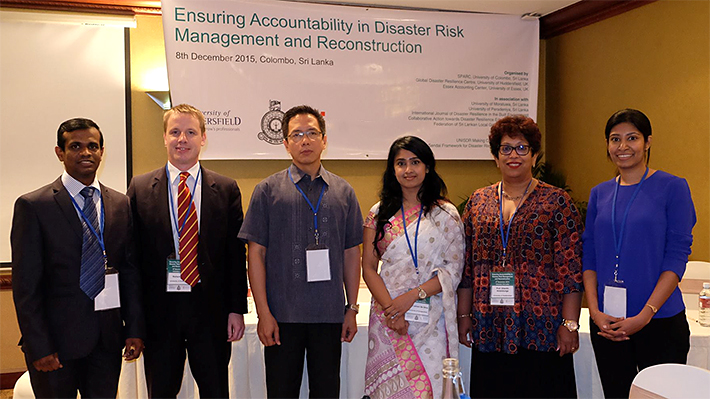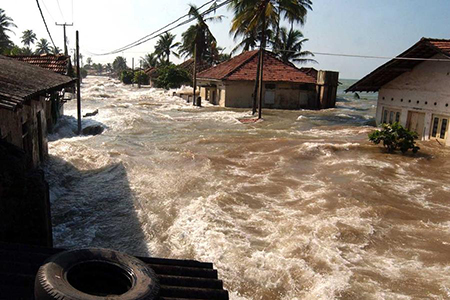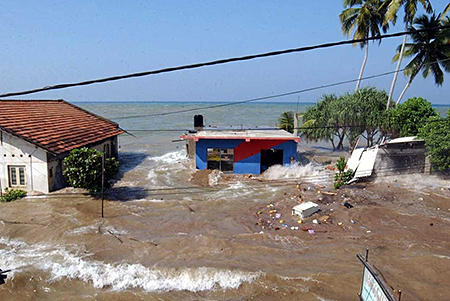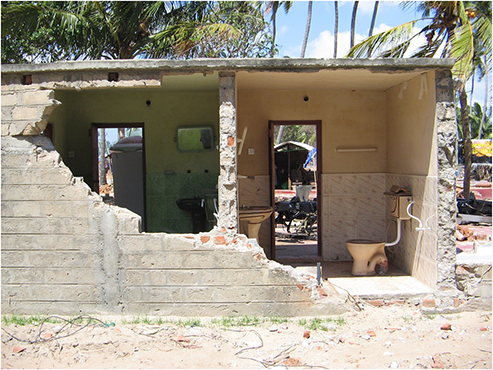€1,000,000 project to reduce the impact of natural disasters
 Huddersfield's Global Disaster Resilience Centre Professors Richard Haigh (second left) and Dilanthi Amaratunga (second right) at the University of Colombo conference 'Ensuring Accountability in Disaster Risk Management and Reconstruction'
Huddersfield's Global Disaster Resilience Centre Professors Richard Haigh (second left) and Dilanthi Amaratunga (second right) at the University of Colombo conference 'Ensuring Accountability in Disaster Risk Management and Reconstruction'
Thu, 21 Jan 2016 13:22:00 GMT
“...the ASCENT research project will revolve around the prevention of disasters and the procedures for recovering from them...”
 A ONE million euro, multi-national project aimed at reducing the impact of disasters and boosting the ability of communities to recover from them is to be headed by the Global Disaster Resilience Centre (GDRC) based at the University of Huddersfield’s School of Art, Design and Architecture.
A ONE million euro, multi-national project aimed at reducing the impact of disasters and boosting the ability of communities to recover from them is to be headed by the Global Disaster Resilience Centre (GDRC) based at the University of Huddersfield’s School of Art, Design and Architecture.
Major beneficiaries of the research will be vulnerable Southeast Asian countries such as Sri Lanka and Thailand – devastated by a tsunami in 2004 – but the lessons learned will be widely applicable and the list of ten universities taking party includes several in Europe.
The project is named ASCENT (Advancing Skill Creation to Enhance Transformation) and it is funded by the European Commission, which developed the concept and issued a call for universities and research institutions to take part. Huddersfield’s Global Disaster Resilience Centre was awarded the lead role.
A key aim of the project is to improve the research capacity of higher education institutions in the countries taking part so that they can develop ways of making societies more resilient to disasters. There will also be an emphasis on research partnerships between industry and universities, plus greater international collaboration.
 The GDRC team at the University of Huddersfield that will co-ordinate ASCENT consists of Professor Dilanthi Amaratunga, Professor Richard Haigh and Dr Kaushal Keraminiyage, plus Dr Ezri Hayat.
The GDRC team at the University of Huddersfield that will co-ordinate ASCENT consists of Professor Dilanthi Amaratunga, Professor Richard Haigh and Dr Kaushal Keraminiyage, plus Dr Ezri Hayat.
Professor Amaratunga said that the project will be thoroughly inter-disciplinary. “We will be working with a variety of university departments – including science, civil engineering, sociology and geography – because we are trying to build research capacity around the overall problem rather than a specific subject,” she explained. The research will revolve around the prevention of disasters and the procedures for recovering from them.
ASCENT is a three-year project that starts on 1 February 2016 with an initial meeting in Sri Lanka, where the work schedules for the partner institutions will be settled. There will be a sequence of further meetings, including two residential schools designed to provide rigorous training in capacity development. One of these will be held at the University of Huddersfield.
 ◄ Tsunami damage
◄ Tsunami damage
Partners in the GDRC-led project are:
- University of Central Lancashire, UK
- Lund University, Sweden
- Mid Sweden University, Sweden
- Vilnius Gediminas Technical University, Lithuania
- Tallinn Institute of Technology, Estonia
- University of Moratuwa, Sri Lanka
- University of Colombo, Sri Lanka
- University of Ruhuna, Sri Lanka
- University of Naresuan, Thailand
- Chiang Mai University, Thailand
- Dhaka University, Bangladesh
- PSTU University, Bangladesh
- BRAC University, Bangladesh
Associate partners are:
- Federation of Sri Lankan Local Government Authorities
- Asian Disaster Preparedness Centre, Thailand
In addition to the key associate partners, there will be other stakeholders who also will be associating with ASCENT and who will help the core team to disseminate the project findings within the society at large.







